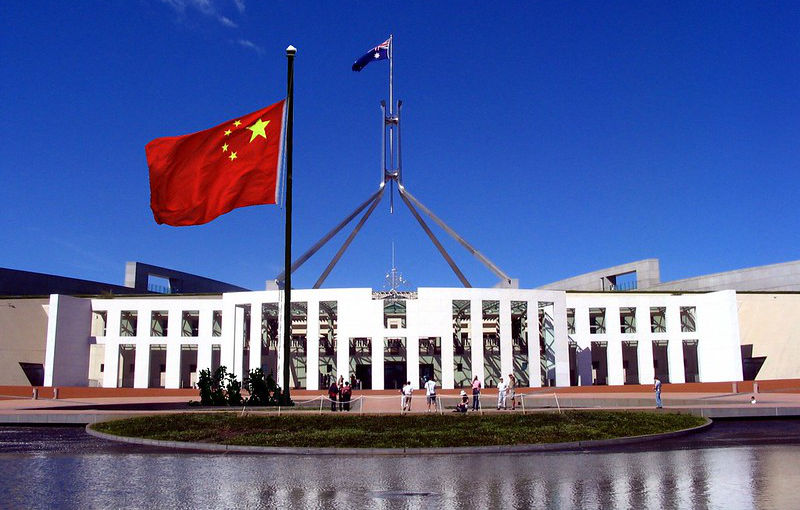
We think it can’t get worse, then it does. Scott Morrison mocks the idea of talking to the new Chinese Ambassador, at least not until China agrees to have dialogue with Australian government ministers.
The new Chinese Ambassador Xiao Qian seems to want a reset in relations. However, every issue in world politics draws ire for China from our Prime Minister, who argues he will never give in to demands from an autocratic country like China. If the war in Ukraine were not enough, we now have more disputes over the South Pacific and a hostile report on Chinese influence in higher education. It looks as if the Chinese have given up on Morrison.
It’s not clear there will be a reset if Labor wins the election. But it’s increasingly likely there will not be one if it doesn’t.
By way of background, let’s note that a “fact sheet” on the 2022 U.S. National Defense Strategy, issued on 28 March 2022, still had China as the main threat. It said that “The Department [of Defense] will act urgently to sustain and strengthen deterrence, with the People’s Republic of China (PRC) as our most consequential strategic competitor”. It is true that the fact sheet considered Russia “poses acute threats, as illustrated by its brutal and unprovoked invasion of Ukraine”, but still ranked it behind China in terms of the need for deterrence. So, when Biden spoke by telephone to Xi Jinping on 18 March and threatened him with sanctions on China if he dared help Russia in the war against Ukraine, what he was actually doing was to try and persuade Xi that he should help the West against Russia so that it (the West) could then more easily defeat China. Biden must think Xi Jinping a very naïve and pliable person.
So, with the American masters/partners intending to act urgently to strengthen deterrence against China as the main threat, Australia’s own prime minister seems to want to follow suit and maintain his rage against China, even when the new Chinese Ambassador shows conciliation. He has contributed to theory with his declaration about an “arc of autocracy”. His hostility to China makes him virtuous, sensible and loyal to the U.S.
However, there may be more than one view about his morality. On 29 March, outgoing Senator Concetta Fierravanti-Wells said in Parliament that Morrison was a bully and autocrat without moral compass, and not fit to be prime minister. Strong words from anybody, but especially one on the same side of politics!
One area of the world to arouse both Australian government and opposition is China’s influence in the South Pacific. There’s already a substantial history of China’s involvement in the region, which is interesting and important, but too complicated to pursue here. Evidence of China’s presence has been growing lately and is unwelcome both to Australia and New Zealand.
When a leaked document mentioned the possibility of Chinese military presence in the Solomon Islands, Morrison commented on 28 March: “The reports that we’ve seen are not a surprise to us and are a reminder of the constant pressure and threats that present in our region to our own national security”. Jacinda Ardern said the development was gravely concerning and expressed preference for the Solomons to look to “our Pacific family”.
The Solomons Prime Minister Manasseh Sogavare found the Australian (and New Zealand) response insulting. He said there was absolutely no possibility of a Chinese military base in the Solomons, a suggestion he described as ludicrous. He said the Solomons wanted good relations with every country. Chinese Foreign Ministry spokesperson Wang Wenbin warned that any attempt to disrupt the mutually beneficial cooperation between the Solomons and China would end in failure.
It is reasonable for Australia and New Zealand to be concerned for their security. But reactions from Morrison, Jacinda Ardern and Australian Defence Minister Peter Dutton struck me as overbearing and colonial in mentality. The Solomon Islands is an independent country, not an Australian colony. It does not have to consult Australia before negotiating a deal with China. I think it is good both for the Solomons and the region for that country to have good relations with all countries, including China. Similarly, for Ardern to tell Sogavare he should limit his diplomacy to “our Pacific family” and keep China out strikes me as very patronizing. It does not surprise me that Sogavare found the whole episode as insulting.
This year’s Federal Budget, brought down on 29 March, had quite a bit of money allocated to national security, the main enemy implied as China for Australia, as for the U.S. The Budget allowed for about $10 billion over the next decade to develop cybersecurity in Australia, but nothing to address the issue of climate change. Certainly, the budget’s main purpose is to keep the Coalition in power, but those seem outrageous priorities to me. And they don’t even include the billions allocated to nuclear-powered submarines promised under the AUKUS agreement.
Another development with potential to undermine Australia’s China relationship even further was the release, on 25 March, of a long-awaited government report on Chinese interference in the Australian higher education sector. Entitled “Inquiry into national security risks affecting the Australian higher education and research sector”, it came out over the authorship of the Parliamentary Joint Committee on Intelligence and Security. Chaired by Senator James Paterson it is predictably extremely hostile to anything smelling of Chinese influence. It has 27 recommendations all of them aiming to show the danger of Chinese influence and curb it. Recommendation 3 is that the Committee should “assist universities to introduce, maintain and develop relevant training on national security issues for staff and students. Universities should employ an accountable authority who is responsible for managing foreign interference risks at their institution.”
Personally, I know and trust some of the people involved in developing this report. On the other hand, James Paterson and Eric Abetz (also on the Joint Committee) are famous for their relentless hostility to anything to do with the Chinese government. What I fear is that these recommendations will have the effect of clamping down on research cooperation with China, and even research about contemporary China. It is likely to put further restrictions on freedom of thought regarding China in the higher education sector. It seems to me that this committee was unnecessary from the get-go and that the report implies an assumption that anything Chinese is dangerous, that Chinese students are likely to be hostile elements serving the Chinese Communist Party, not just ordinary Chinese who support their government. I can’t see how the overall result can be anything but harmful to Australia-China relations.
The fault isn’t only on Australia’s side. Geoff Miller wrote in Pearls & Irritations on 29 March of an “apparent decision” by the Chinese government to freeze relations with Australia at ministerial level and higher. But for Morrison to agree to meet the new Ambassador anyway might show conciliation, whereas refusal merely confirms the Chinese in their view that reasonable dealings with him as prime minister are virtually impossible. It is obvious that the Chinese have given up on Morrison and that a reset of relations under him is out of the question. It is by no means certain under a potential Albanese government, but I continue to hope for a lifting of this freeze on relations from China and a more rational attitude from the Australian side.




